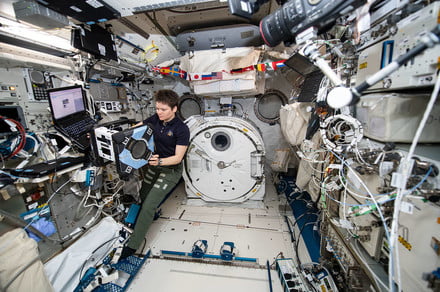NASA astronaut Anne McClain performs the first series of tests of an Astrobee robot, Bumble, during a hardware checkout. NASA
The idea of traveling into space sounds pretty amazing. However, there’s plenty about it that’s less desirable — even without some Gravity or The Martian-style accident taking place.
A new study carried out by researchers from the University of Texas Medical Branch at Galveston shines a light on the impact that reduced gravity conditions during spaceflight missions has on space travelers. TL;DR version: It’s not unlike the effects of extended bed rest in terms of extreme muscle loss. But while that sounds pretty bad, researchers may have found a solution — in the form of special hormone treatments tailored to each astronaut.
“Despite dedicating up to 2.5 hours of their daily routine to exercise, many astronauts still lose muscle over the course of the mission,” Edgar Dillon, UTMB assistant professor in the department of internal medicine, told Digital Trends. “We know that the hormone testosterone plays a role in the regulation of muscle protein synthesis. The idea of this study was to investigate whether low doses of testosterone cycled throughout a period of unloading would further protect exercising individuals from losing muscle. Specifically in this paper, we looked at how the exercise and testosterone countermeasures changed the proteins expressed within the muscle, and if some of these proteins measured before bed rest might be able to predict individual outcomes during bed rest.”
The high physical demands of space travel are well known, which is one reason becoming an astronaut requires so much training and preparation. Recent research has suggested that time in space can even physically change the structure of astronauts’ eyes. But understanding more about the effects of diminished gravity on the human body is only going to become more crucial. That’s because, in addition to proposed manned missions to Mars, there’s also a growing interest in civilian space travel. For instance, NASA announced that it will allow private citizens to visit the International Space Station.
In their study, the UTMB researchers placed 24 healthy male participants on bed rest for 70 days. During this period, some were made to follow an exercise regimen and received either testosterone supplements or a placebo. A control group remained in the bed with no exercise or supplements. The changes to their bodies’ muscle proteins were then analyzed. Those who received the exercise and testosterone boosts showcased the most muscle growth. This helped offset some of the negative impacts of enforced bed rest.
“If we could understand the cellular mechanisms behind the physiological adaptations to unloading as well as to specific interventions, it might be possible to predict how much muscle an individual would be likely to lose,” Dillon continued. “[We could] then tailor a countermeasure ‘prescription’ to that individual.”
Editors’ Recommendations
- Volunteers sent to bed for 60 consecutive days in offbeat space experiment
- NASA’s twin study reveals effects of time spent in space on the human body
- In space, clothes can smell really bad. Russian firm seeks way to wash them
- Friendly cube robot Bumble passes its first hardware test aboard the ISS
- After a delayed launch, SpaceX Dragon capsule arrives at the space station

